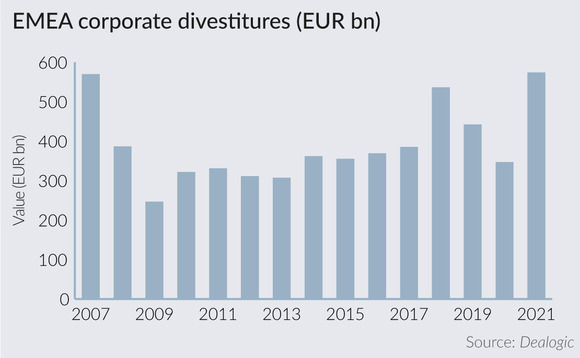
Split the difference – corporate divestitures set records

Under pressure, it is natural to reassess long-term strategy. Last year saw a wave of corporate reorganisations, with several multi-billion-euro shake-ups announced, writes Jonathan Klonowski
Companies have been reinventing themselves during the pandemic, as tech-based propositions continue to disrupt. The trend of corporate Goliaths fighting back against younger, nimbler Davids has accelerated.
Firms have taken advantage of favourable conditions for M&A, including cash-rich and ever-bolder PE funds. EMEA last year saw the highest level of deal-making in the region since the financial crisis of 2008-09.
On the back of this, corporate divestments in 2021 reached EUR 574bn across 2,800 deals, the highest aggregate value on Dealogic record. This eclipsed the previous record set in 2007 of EUR 570bn.
Total value represented a 65.5% rise from the EUR 347bn recorded in 2020. This was driven by 21 corporate divestments worth at least EUR 5bn and eight above the EUR 10bn mark. Among these were National Grid's acquisition of Western Power Distribution from PPL Corp for EUR 16.8bn, and Engie's EUR 7.1bn sale of Equans to Bouygues in November.
PE making up after breaking up
PE firms have been beneficiaries of this uptick in activity. Sponsors have sky-high reserves of dry powder after extraordinary levels of fundraising in recent years. Last year, they were involved in over 30 corporate divestments worth at least EUR 1bn – a record level.
This included Unilever's sale of its black teas business to CVC Capital Partners for EUR 4.5bn, announced in mid-November, although its attempted disposal of a suite of personal-care brands flopped that same month. Earlier in the year, Apax Partners and Warburg Pincus acquired T‑Mobile Netherlands from Deutsche Telekom and Tele2 in a deal worth EUR 5.1bn.
Corporate carve-outs afford PE firms the opportunity to grow separated entities, without the constraints imposed by a low-synergy corporate overlord.
What's new in '22?
This year should have plenty more such opportunities for deal-makers. The first week of 2022 saw the EUR 4.9bn spin-off of heavy-vehicle business Iveco Group from CNH Industrial.
And more is around the corner. Components manufacturer Essentra, for example, has mandated Credit Suisse to assist in the carve-out of its packaging unit, while it simultaneously divests its cigarette-filters business.
ABB announced in early December that it intends to exit its Turbocharging division, either via a spin-off or divestment. It also plans to sell its Power Conversion division and conduct an IPO of its E-mobility division this year. Similarly, GlaxoSmithKline, under pressure from activist investors, intends to separate either by spin-off, or an outright sale of, its consumer-health unit.
Siemens, meanwhile, appears to have several sale processes running. In late November, it reportedly initiated the sale process of its postal-logistics division. The Munich-based engineering giant is also said to be close to selling Yunex Traffic, its traffic-light business, with several PE firms bidding. Moreover, it is rumoured to be mulling an exit of its Large Drive Applications unit.
Breaking up is not always hard to do.
Latest News
Stonehage Fleming raises USD 130m for largest fund to date, eyes 2024 programme
Sponsor acquired the public software group in July 2017 via the same-year vintage Partners Group Global Value 2017
Stonehage Fleming raises USD 130m for largest fund to date, eyes 2024 programme
Czech Republic-headquartered family office is targeting DACH and CEE region deals
Stonehage Fleming raises USD 130m for largest fund to date, eyes 2024 programme
Ex-Rocket Internet leader Bettina Curtze joins Swiss VC firm as partner and CFO
Stonehage Fleming raises USD 130m for largest fund to date, eyes 2024 programme
Estonia-registered VC could bolster LP base with fresh capital from funds-of-funds or pension funds








